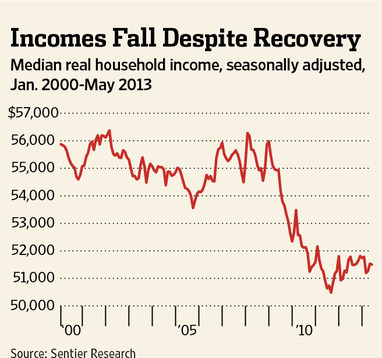
As year 6 of the president’s administration draws near, Charen writes that “Obama’s prescription, which we are now in a position to evaluate for effectiveness, was the most massive increase in regulation of modern times,” adding, “…every new regulation is trussed up and presented as “being on the side of the middle class.“
How has the middle class fared?
- Wealthiest 10% had incomes rise, while the rest of the population had incomes fall.
- Poverty is at a 50 year high.
- Middle class is earning less than in 2007.
- Federal policies have propped up the stock market, which helps the richest Americans, while doing too little for the job market.
Charen, a senior fellow at the Ethics and Public Policy Center (EPPC), quotes Yale Law School’s Jonathan Macey saying, “Sure, Dodd-Frank is a mess; sure, the statute is unwieldy and inefficient; sure, the statute takes power away from citizens and states and transfers it to the federal government. However, it’s not unconstitutional or otherwise illegal for Congress to pass a bad law. And this is what Dodd-Frank is.”
But others say it is unconstitutional, and law suits are working their way through the courts with the goal of seeing the monster 2300 page law that created the Consumer Financial Protection Bureau struck down. By 2013, the EPPC’s senior fellow says, regulations springing from Dodd-Frank totaled 13,789 pages.
She says, “It’s odd that Democrats are so rarely challenged on their claim to speak for the broad middle class, because the story of Democratic policy over the course of the past century has been to withdraw more and more power from ordinary people and place it in the hands of the unelected.”
Indeed, Sentier Research, using federal data, underscore the point made about falling middle class income.
Charen’s commentary doesn’t explore the fact that under Presidents Reagan (R) and Clinton (D), working across the aisle with House Speakers Tip O’Neil (D) and Newt Gingrich (R) respectively, each of those bi-partisan effort created jobs and reduced government dependency. Nor does she mention that Democratic President John F. Kennedy championed cutting tax rates which ended up spurring economic activity and boosted federal tax collections too.
While manufactured housing pros understandably want to claim the mantle as the champions of affordable housing and to grow their market share of housing, are such economic policies the way to achieve that goal? ##
(Photo credit: Mona Charen, EPPC.org, Graphic credit: WSJ and Sentier Research)

